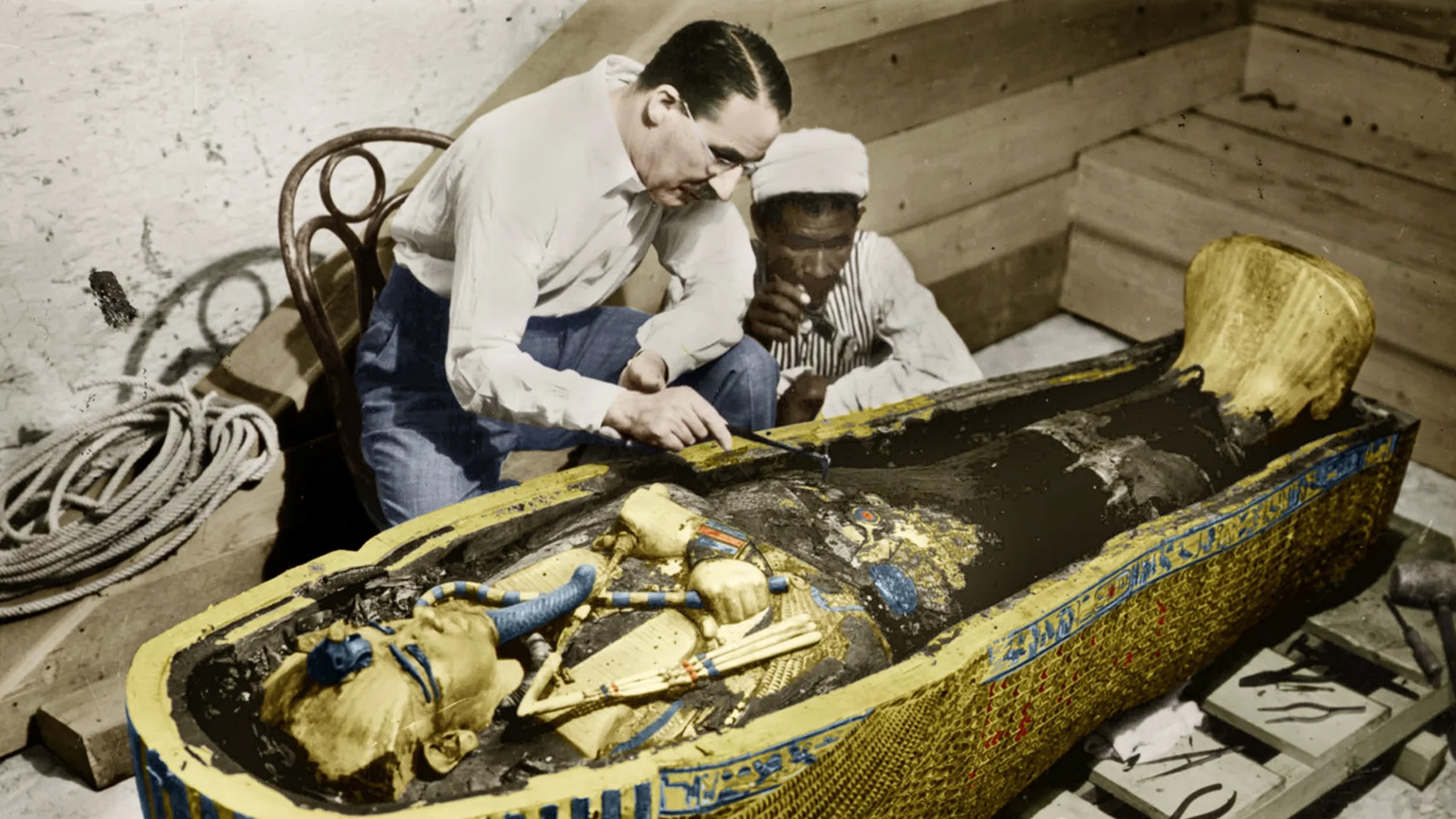Tutankhamun and Carter
Assessing the Impact of a Major Archaeological Find
Slider de Eventos
Data
Local
Auditório 3 Fundação Calouste GulbenkianO evento decorre integralmente em inglês, sem tradução simultânea.
O colóquio internacional Tutankhamun and Carter: Assessing the Impact of a Major Archaeological Find terá lugar na Fundação Calouste Gulbenkian nos dias 16 e 17 de fevereiro de 2023. Este encontro contará também com transmissão online. A inscrição é gratuita e deve ser feita até ao dia 10 de fevereiro.
O evento insere-se na programação complementar da exposição Faraós Superstars, patente na Galeria Principal da Fundação até 6 de março de 2023.
O colóquio visa reunir investigadores interessados no estudo das coleções egípcias e da sua história recente, com foco particular no Túmulo de Tutankhmon, na carreira de Howard Carter e no seu envolvimento com colecionadores de arte.
Tutankhamun and Carter: Assessing the Impact of a Major Archaeological Find é organizado pelo Centro de História da Faculdade de Letras da Universidade de Lisboa em parceria com o Museu Calouste Gulbenkian.
Imagem © Griffith Institute, Universidade de Oxford
Programa
10:00 / Abertura do balcão de registo
11:00 – 12:00 / Orador principal
Understanding the Reigns of Tutankhamun and His Predecessors from the Objects in the Tomb of Tutankhamun
Nozomu Kawai – Kanazawa University
Moderação: Tine Bagh – Ny Carlsberg Glyptotek
12:00 – 12:30 / Sessão de abertura
— Almoço —
14:00 / Carter and Tutankhamun’s Tomb
The Tutankhamun Affair in the Lacau archives: the Diplomatic Stakes of a Discovery
Carole Jarsaillon – École Pratique des Hautes Études
The Archaeological Thought in Howard Carter: on Manuals, Methods and Tools in the Excavation of the Tomb of Tutankhamun
Daniel Carvalho – UNIARQ – Centro de Arqueologia da Universidade de Lisboa; LAQU – Quantitative Archaeology Lab of Universitat Autònoma de Barcelona
The Laboratory in the Tomb Next Door: Lucas and the Science of Conserving Tutankhamun’s Treasures
Jenny l. Cashman – Polytechnic School, Pasadena
The Remains of the South Wall in the Tomb of Tutankhamun
Lyla Pinch – Royal Ontario Museum
Moderação: Maria Helena Trindade Lopes – CHAM – Centro de Humanidades, Universidade Nova de Lisboa
15:40 – 16:40 / Orador principal
A Chronicle No Longer Gold: Re-presenting the Oxford Archive in 2022
Richard Bruce Parkinson – University of Oxford
Moderação: Gabriele Pieke – CIPEG/Reiss-Engelhorn Museen
— Pausa para café —
17:00 – 18:40 / Re-discovering Tutankhamun’s Find
Materials, Technologies, and Archaeological Documentation
André J. Veldmeijer & Salima Ikram – American University in Cairo
The Furniture that Shapes our World. A Re-examination of Tutankhamun’s Beds, Chairs, and Thrones
Manon Y. Schutz – Universität Münster, University of Oxford
Tutankhamun’s Miniatures: The Power of Small-Scale Objects in Ancient Egyptian Funerary Customs
Inês Torres – CHAM – Centro de Humanidades, Universidade Nova de Lisboa
‘Absolutely New in Type’: The Anthropomorphized Signs on the Monuments of King Tutankhamun
Ghada Mohamed – Cairo University
Moderação: Nelson Ferreira – Centro de Estudos Clássicos e Humanísticos, Universidade de Coimbra
19:30 / Jantar da conferência
09:30 – 11:40 / The Impact of Tutankhamun’s Find
Tutankhamun in Portugal. Reports in the Portuguese Press (1922 – 1939)
José Sales – Centro de História da Universidade de Lisboa Centro de Estudos Globais da Universidade Aberta
Susana Mota – Centro de Estudos Globais da Universidade Aberta
The Impact of Tutankhamun’s Tomb Discovery in Agatha Christie ‘s Novels and Short Stories
Nuno Simões Rodrigues – Centro de História da Universidade de Lisboa; Centro de Estudos Clássicos e Humanísticos da Universidade de Coimbra
‘Leonard Woolley Saw with the Eye of Imagination’: the Discoveries at Ur in the 1920s
Fátima Rosa – Centro de História da Universidade de Lisboa
Hearts of Glass: Identifying the Styles and Sources of the Neiger Brothers’ Egyptian Revival Jewellery
Jasmine Day – Investigadora independente; Ancient Egypt Society of Western Australia Inc
The ‘Tutanchamun’ Exhibition of the Years 1980 and 1981 in Germany and its Research, Museographic and Sociological Repercussions. The Definitive Recognition of ‘the Egyptian’ in Society
José Pérez Negre – Universidad de Alcalá de Henares
The Beat of the Pharaoh: Verdi’s Aida and the Long Thread of Cultural Fascination for Ancient Egypt
Lorenzo Zaccaria – Centro de Estudos Clássicos da Universidade de Lisboa
Moderação: Luís Manuel de Araújo – Centro de História da Universidade de Lisboa
— Pausa para café —
12:00 – 13:00 / Orador principal
Tutankhamun. Howard Carter, Calouste Gulbenkian, and the Market for Egyptian Art in the 1920s
Tom Hardwick – Houston Museum of Natural Science
Moderação: João Carvalho Dias – Museu Calouste Gulbenkian
— Almoço —
14:30 – 16:10 / Tutankhamun and Pop Culture
Tutankhamun, the Pop Idol: The Tut-Mania Phenomenon and its Influence on the Wider Public
Valentina Santini – University of Birmingham, CAMNES
Howard Carter’s 1922 Discovery of Tutankhamen’s Tomb: its Impact on Archaeology and the Media
Anna L. Pearman – Vincennes University
The Influence of the Discovery of Tutankhamun on Contemporary Cinema and Comics
Abraham Fernandez Pichel – Centro de História da Universidade de Lisboa
‘Tut-mania’ Through the Iconography of Egyptian Ex Libris
Valentin Boyer – École du Louvre
Moderação: Guilherme Pires – CHAM – Centro de Humanidades, Universidade Nova de Lisboa
— Pausa para café —
16:30 / Tutankhamun and the Legacy of Amarna
The Man Behind the Mask. On Royal Portraiture in Post-Amarna Art
Dimitri Laboury – F.R.S.-FNRS – University of Liège
Tutorial ‘How to Change Your Predecessors’ Names into Tutankhamun’
Katja Broschat – Römisch-Germanisches Zentralmuseum
Tutankhamun and Post-amarnian Visions of Afterlife
Rogério Sousa – Centro de História da Universidade de Lisboa
Moderação: José Augusto Ramos – Centro de História da Universidade de Lisboa
17:50 / Conclusões
Daniela Picchi – Museo Civico Archeologico in Bologna
Moderação: Manuela Cantinho – Sociedade de Geografia de Lisboa; Centro de História da Universidade de Lisboa
A Fundação Calouste Gulbenkian reserva-se o direito de recolher e conservar registos de imagens, sons e voz para a difusão e preservação da memória da sua atividade cultural e artística. Caso pretenda obter algum esclarecimento, poderá contactar-nos através do formulário Pedido de Informação.

